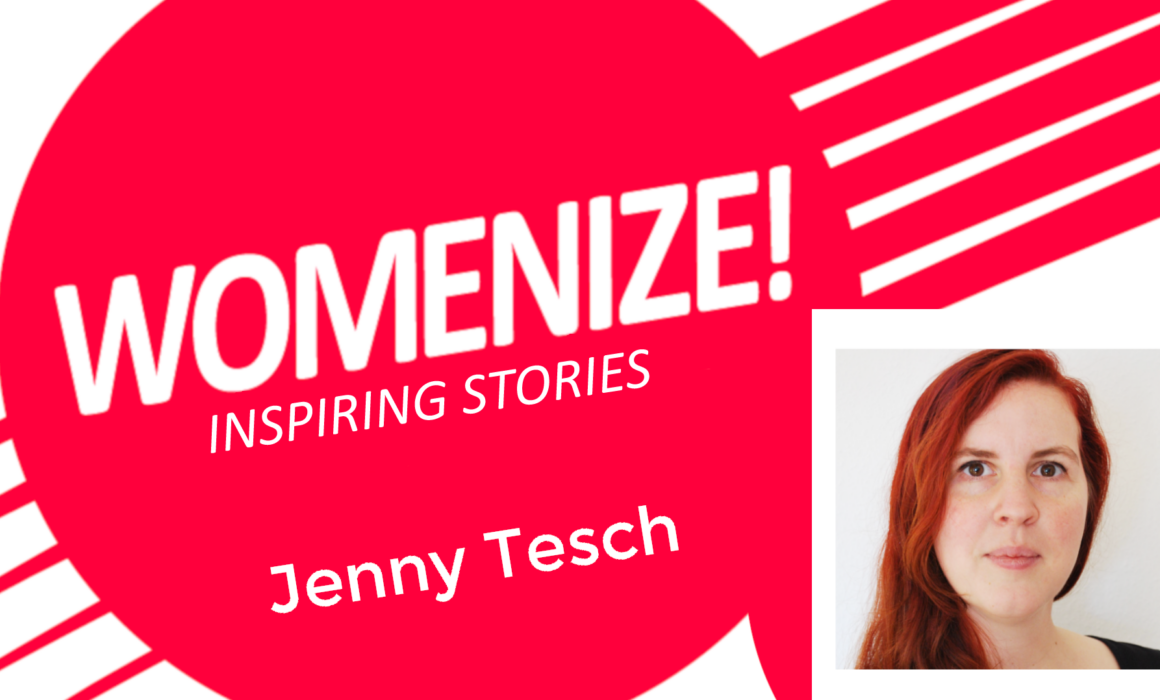Jenny Tesch – Womenize! – Inspiring Stories
Womenize! – Inspiring Stories is our weekly series featuring inspirational women from games and tech. For this edition we talked to Jenny Tesch, CEO and Digital Artist of Totally Not Aliens. She talks about her path from computer science to founding her own company, highlighting the significance of diverse skills in smaller teams, balancing her CEO role with a passion for graphics, and encouraging gender diversity in the gaming industry. Read more about Jenny in this interview:
Hi Jenny! Could you share some insights into how your educational background in Computer Science and Virtual Design, combined with your early experience as a 3D Artist, shaped your path towards founding your own company in 2017?
Very early on, I decided that I would like to develop games as a career. However, when I did my Abitur in 2004, university programmes in game development were rare in Germany, and most of them were quite expensive. So I started studying computer science at the then still called Technical University of Karlsruhe (now KIT), did my Vordiplom in it and switched to Virtual Design in Kaiserslautern some time after, as I really wanted to get a better grasp of the graphical side of game development and had realised that I didn’t want to work purely as a programmer.
Both while working at Cooee during my studies in Kaiserslautern and afterwards at Upjers, I realised how valuable my computer science background was for the development of graphics in games and I think that was also one of the reasons why I was asked to step in for the head of the graphics department when she went on parental leave after I had been working there for barely six months. I believe that this time in particular helped me a lot to develop the confidence to set up and run our own studio.
In game development, many areas intertwine and an understanding of the processes behind them and the work of the other development areas, in my opinion, contributes greatly to the development of good games. While experts in certain areas are definitely an important part of game development, I think it’s especially important in smaller teams to have experience in many areas of game development.
How has your artistic expertise influenced your approach as a CEO, and how do you maintain a balance between these two aspects of your career?
Creating graphics and bringing them to life is definitely still the area of game development that I enjoy the most. That’s why I always try to make time for it, even though management often takes up a lot of my daily work. I realized that especially in times when we had several employees and I had to work almost full-time purely as a managing director, I really missed being involved in the development myself and getting better at the practical work of game development. I like teaching people and supporting them in their development, but I also like to develop myself and become a better game developer over time.
Therefore we plan on remaining a small team. This also gives us the flexibility to devote ourselves to smaller, niche, innovative game projects and topics that would be too risky for larger companies.
Could you elaborate on some of the obstacles you’ve encountered and the strategies you’ve employed to overcome them? What guidance or recommendations do you offer to aspiring female professionals aiming for leadership roles in the gaming world?
The biggest learning experiences in my time as CEO so far has been in interpersonal matters. In our team, we have learnt how important it is to address problems clearly and as early as possible. It was also a big step for me to learn how to make leadership decisions. No matter how much you all want to work together at the same level, in my experience there always needs to be one person in the team who has the last word and takes responsibility for sometimes difficult decisions.
Fortunately, we’ve come a long way in the German games development industry in terms of gender equality, so being female has never been an issue for me as a CEO. I can only encourage women who are interested in taking on management responsibility in our industry and hope that they will have as good an experience as I have had so far.
What I have noticed, however, is that many women apply to us as a result and they often say that they felt more invited when there’s already a significant number of women working in the team. I therefore think it is very important that we continue to strive to become more diverse in game development and that we eventually arrive at a point where we also have teams with a wide variety of ethnic and cultural backgrounds, as this will help us to develop more diverse games.
Thanks for this interview, Jenny!
Jenny’s links: LinkedIn
Womenize! – Inspiring Stories Feature by Madeleine Egger

